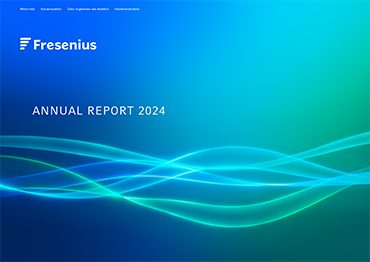Home

March 26, 2025
Bad Homburg, Germany
Publication Annual Report 2024
Consolidated Financial Statements and Management Report (IFRS)
Share
Services

Fresenius is one of the top 40 companies in Germany in terms of market capitalization and is included in Germany's leading index, the DAX. We are also listed in the STOXX Europe 600 Health Care, the FTSEurofirst 300 and the DAXsector Pharma & Healthcare indices.
Fresenius ordinary shares are traded on the stock exchanges in Frankfurt, Düsseldorf and Munich.
At the end of July 2022, Fresenius SE & Co. KGaA's capital stock was 563,237,277 ordinary shares. The shares are notional no-par-value shares. Each share represents €1.00 of the capital stock.
Basic Share information
| Ordinary share | |
|---|---|
Securities identification no. | 578 560 |
Ticker symbol | FRE |
ISIN | DE0005785604 |
Bloomberg symbol | FRE GR |
Reuters symbol | FREG.de |
Main trading location | Frankfurt/Xetra |
Paying agent | Deutsche Bank AG, Taunusanlage 12, 60325 Frankfurt am Main, Germany |
Key data
| 2024 | 2023 | 2022 | |
|---|---|---|---|
Numbers of shares | 563,237,277 | 563,237,277 | 563,237,277 |
Stock exchange quotation1 in € | |||
High | 34.85 | 31.11 | 37.88 |
Low | 24.54 | 23.46 | 20.04 |
Year-end quotation | 33.54 | 28.07 | 26.25 |
Market capitalization2 in million € | 18,891 | 15,810 | 14,785 |
Total dividend distribution in million € | 5633 | - | 518 |
Dividend per share in € | 1.003 | - | 0.92 |
Earnings per share in €4 | 3.11 | 2.67 | 3.08 |
Contact

Vice President Investor Relations
Deputy Head of Investor Relations
T: +49 (0) 6172 608-5167
florian.feick@fresenius.com
Related Links
Interactive Tool
Nutrition is a topic which is all around us, day by day. While we often talk about obesity and weight loss diets we actually overlook that the opposite, meaning mal- or undernutrition, can be as detrimental. We talk about malnutrition when our body is not provided with sufficient energy and nutrients over several days. These nutrients, for example protein, carbohydrates, fats, vitamins and minerals, are necessary to ensure all essential functions of the body.
When our nutritional status is not optimal our body will get weaker in its reaction towards challenges, such as a disease, a cold or an infection. Improving our nutritional status will therefore support and protect our body.
Every normal form of nutrition is actually enteral. The word, which comes from the Greek “enteron,” or intestines, means, “using the gastrointestinal tract.” Enteral nutrition therapies are designed for patients who cannot nourish themselves sufficiently but still have an adequate digestive function. It is therefore ideal for patients who experience problems chewing or swallowing, loss of appetite, suffer from neurological or gastro-intestinal diseases, or are unconscious. Enteral nutrition is administered via sip feeds or also tube feeds.
If you are not able to eat enough, sip feed nutrition can help to make up for this deficit. Sip feed nutrition can be taken by mouth, swallowed and digested like normal food. It is flavorful, liquid food and contains all nutrients such as carbohydrates, fats and fiber as well as vitamins, minerals and trace elements.
Sip feed nutrition is balanced. It contains all the nutrients required by a person. Therefore, it can be drunk or eaten in addition to normal food but is also suitable as a sole source of nutrition.
Tube feed nutrition can help you to meet your nutritional needs in times when you are not able to eat enough.
Tube feeding is a procedure used for administering liquid nutrition directly into the stomach or small intestine. To do this, a thin tube (probe) is inserted either through the nose (nasal probe) or through the abdomen into the stomach.
Patients who are given Fresenius Kabi infusion solutions receive all the components of balanced nutrition: carbohydrates, amino acids and fats as well as minerals, vitamins and trace elements. The composition of these nutritional solutions can be precisely balanced to feed a patient for any period of time.
Parenteral nutrition is necessary when the stomach or intestine – for instance due to an illness or operation – can no longer perform their tasks. A doctor may also decide that a patient should receive parenteral nutrition prior to an operation or during lengthy examinations when he or she is not allowed to eat. In intravenous nutrition, all key nutrients enter the bloodstream as molecular components. A patient can rely on parenterally given nutrients for a long period of time.
There are a number of liquids with a variety of compositions that can be used for parenteral nutrition therapy either on their own or as a mixture. When deciding on the best nutritional therapy, the general condition of the patient plays an important role, as well as a patient’s age and weight. There are also solutions for patients with kidney or liver disease that contain a special composition of amino acids. Fresenius Kabi offers amino acids and carbohydrates as single components but also as a combination that contains both nutritional elements. Three-chamber bags contain all three important nutrients including fats.
Carbohydrates are the most important source of energy in parenteral nutrition. Often, glucose alone is sufficient. Glucose is a "universal fuel" that can be utilized by all the body’s cells, making it a standard nutrient for parenteral nutrition. Doctors can choose between solutions with different glucose concentrations. Combined solutions also contain other nutritional components besides carbohydrates.
Amino acids are the smallest components of proteins that perform many tasks in the body. Every organ requires proteins for its structure and function. Proteins transport, act as messengers, fight germs or control and create vital metabolic reactions. They are also important building blocks for muscles, hair and finger nails, for example.
All proteins consist of different amino acids. Therefore, amino acids are also indispensable for parenteral nutrition. Fresenius Kabi offers solutions containing amino acids in an ideal composition that the body can use to generate the required proteins.
Fats contain lots of energy and essential fatty acids
Fats contain not only a lot of energy, but also important fatty acids that the body itself cannot produce. These essential fatty acids help build up cell membranes and transmitters that regulate the metabolism.
Patients who are fed parenterally receive the fats as microscopic droplets that are suspended in a liquid known as emulsion. When this emulsion is infused into the blood stream, the tiny droplets disperse in the blood and can be absorbed by the body's cells. Fat emulsions help doctors to provide critically-ill patients with quickly-available energy while offering a reliable source of essential fatty acids.
Contact
Fresenius Kabi AG
Else-Kröner-Str. 1
61352 Bad Homburg
Germany
T: +49 6172 686-0
communication@fresenius-kabi.com

Fresenius Kabi is a global healthcare company that specializes in lifesaving medicines and technologies for infusion, transfusion and clinical nutrition. The company’s products and services are used for the therapy and care of critically and chronically ill patients.
Its product portfolio comprises a range of highly complex biopharmaceuticals, clinical nutrition, medical technologies, and I.V. generic drugs. Within biopharmaceuticals, Fresenius Kabi offers, among others, biosimilar drugs with a focus on autoimmune diseases and oncology. The company’s clinical nutrition portfolio includes a wide selection of enteral and parenteral nutrition products. In the segment of medical technologies, Fresenius Kabi offers vital disposables, infusions pumps, apheresis machines, cell therapy devices, and more.
Following its “Vision 2026”, the company is furthermore committed to increase efficiencies in the therapy and care of patients and improve access to high-quality healthcare around the globe. Fresenius Kabi aspires to be leading globally in its product segments – all for the benefit of patients, its customers, and its stakeholders.
Fresenius Kabi employs over 40,000 people worldwide. In 2024 the company reported sales of more than €8 billion. Fresenius Kabi AG is a wholly owned subsidiary of the Fresenius SE & Co. KGaA healthcare group and one of the two Operating Companies of Fresenius.
Contact
Fresenius Kabi AG
Else-Kröner-Str. 1
61352 Bad Homburg
Germany
T: +49 6172 686-0
communication@fresenius-kabi.com
You will be now forwarded to the Fresenius Career page.
If the automatic redirect is not working, please click on the following link.

March 26, 2025
Bad Homburg, Germany
Consolidated Financial Statements and Management Report (IFRS)
Fresenius Kabi has agreed to collaborate with Phlow Corporation, a public benefit company, to expand access to affordable sterile injectables formulated for U.S. children’s hospitals and to help strengthen the supply chain for U.S.-sourced API and essential medicines. The companies will work together to supply private-labelled products, co-develop and manufacture novel products and make essential medicines rapidly available in the event of a public health emergency.
Fresenius Kabi has agreed to collaborate with Phlow Corporation, a public benefit company, to expand access to affordable sterile injectables formulated for U.S. children’s hospitals and to help strengthen the supply chain for U.S.-sourced API and essential medicines. The companies will work together to supply private-labelled products, co-develop and manufacture novel products and make essential medicines rapidly available in the event of a public health emergency.
Ensure financial flexibility, maintain our investment grade rating, limit refinancing risks and optimize the cost of capital are the main objectives in Fresenius’s financing strategy.
To remain financially flexible, we maintain adequate liquidity headroom. We are committed to our investment grade rating, which provides us with advantages with respect to market access and funding costs.
Our refinancing risks are limited due to a balanced maturity profile that is characterized by a broad range of maturities with a high proportion of mid- and long-term debt up to 2033. Relevant financing instruments include bonds, Schuldschein Loans and bank loans. In addition, Fresenius maintains a commercial paper program.
Another key objective of Fresenius’ financing strategy is to optimize the cost of capital by employing an adequate mix of equity and debt.
In 2025, deleveraging will remain a key priority. Fresenius has upgraded its leverage target corridor to 2.5 to 3.0x net debt/EBITDA (previously 3.5 to 3.0x). This allows us to stay financially flexible while solidifying our solid investment grade rating.
1 Prior-year figures have been adjusted due to the application of IFRS 5 to the deconsolidated operations of Fresenius Medical Care
2 Before special items
3 At average exchange rates for both net debt and EBITDA; pro forma closed acquisitions/divestitures, including lease liabilities, including Fresenius Medical Care dividend
Contact

Director Investor Relations
T: +49 (0) 6172 608-2486
elisabeth.truckenbrodt@fresenius.com
Related Links
Interactive Tool
Here you can find a variety of information:
Our Corporate Communications team can be reached at pr-fre@fresenius.com.

February 26, 2025 - 10:00 am
Bad Homburg, Germany

Dennis Hofmann
Head of Corporate Communications T +49 (0) 6172 608-96008

Fresenius Helios is one of the largest and most medically-advanced operators of both in- and outpatient care in Europe, offering expertise in all areas of clinical care.
Fresenius Helios owns and operates Helios hospitals in Germany and Quirónsalud hospitals in Spain and Latin America. Every year more than 24 million patients choose Helios for medical treatment, of whom 22.2 million are outpatients. Fresenius Helios is committed to the highest quality clinical and nursing care.
Based in Berlin, Helios owns and operates 87 clinics, including seven maximum care hospitals in Erfurt, Berlin-Buch, Duisburg, Wuppertal, Schwerin, Krefeld and Wiesbaden. Helios hospitals provide inpatient care to about 1.2 million patients annually.
As the only hospital group in Germany Helios operates its own hospitals ranging from basic care starting at 46 beds to maximum care with 1,500 beds. The acute care hospitals offer nearly the full spectrum of medical services at a high level of quality. Some Helios clinics are renowned beyond Germany’s borders for their outstanding medical achievements.
By combining senior citizens’ homes and acute medical care, Helios gives residents access to optimum, fast medical care. Helios has already implemented this intelligent and trend-setting concept of short distances for seniors at nine of its hospitals.
Helios strives to expand its integrated medical care offering. This is made possible through cooperations with non-hospital providers, especially local doctors’ practices, as well as our own medical care centers close to the hospitals. Our medical care centers are only established where they offer a useful complement to our hospitals and when high-quality outpatient care cannot be guaranteed over a long period through cooperations with local doctors’ practices. In medical care centers, patients are treated before or after an inpatient hospital stay. An important goal is to avoid unnecessary duplication in examinations, because high quality and competent medical care in conjunction with the rational use of resources best serves the well-being of patients.
Quirónsalud operates 57 hospitals, 100 outpatient centers and around 300 occupational risk prevention centers. Active in every major metropolitan region of Spain, and now with seven hospitals in Latin America, Madrid-based Quirónsalud has more than 49,000 employees.
Extreme concentration and the most modern medical technology: Here you can take a look around the operating room as Peter Horn, M.D., PhD, Head of Neurosurgery at Helios Hospital Dr. Horst Schmidt Kliniken, successfully removes a 4-centimeter (1.6-inch) tumor from a patient’s brain.
Contact
Helios Kliniken GmbH
Friedrichstr. 136
10117 Berlin
Germany
T +49 30 521 321-0